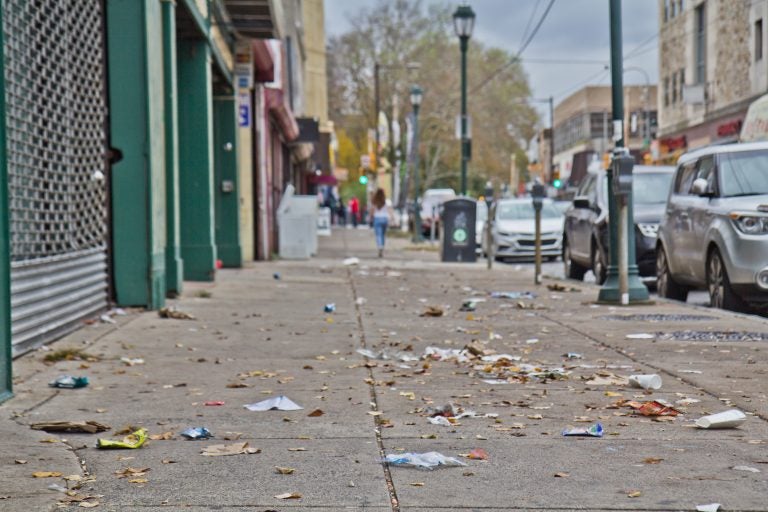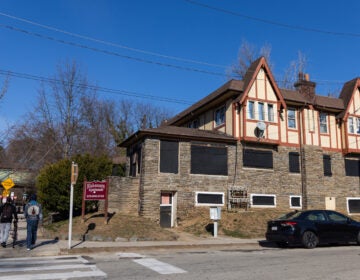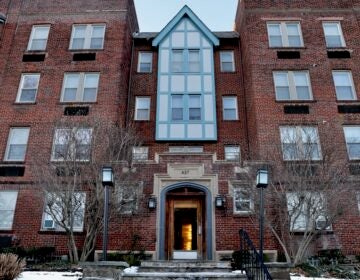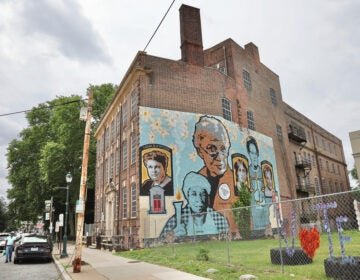Germantown businesses revolt against taxing district that didn’t deliver on clean streets promise
After a bad year, the Germantown Special Services District was in the red and unable to do its one main job: keep the streets clean.

An unswept street in the Germantown Special Services District on Nov. 2, 2018. (Kimberly Paynter/WHYY)
This article originally appeared on PlanPhilly.
—
Jamar L. Kelly faces a monumental challenge. The interim executive director of the Germantown Special Services District knows his organization is failing at its core mission of keeping the neighborhood’s commercial corridors free of garbage. He sees it in the newspapers and plastic bags that swirl across his path every day, and in the discarded soda cans and cigarette butts mashed into the sidewalk.
“Make no mistake, when I pulled up on Oct. 15, I didn’t want to get out of my car on the avenue,” said Kelly, referring to his first day on the job. “We all get it. Cleaning is something we have to address to present a more welcoming environment.”
Kelly is the fourth executive director hired in five years to lead the taxpayer-funded municipal authority tasked with keeping the business district around Germantown and Chelten avenues clean. The mess he inherited — Kelly is the organization’s sole employee — extends beyond dirty streets and stretches back decades.
Germantown Special Service District is one of a number of local authorities funded primarily by property owners who pay a fee levied on their property tax assessment in exchange for increased services.
These authorities typically are quiet technocratic affairs that operate without much controversy, under the purview of their district City Council representatives. The district Council representative — Cindy Bass, in the case of the Germantown group — appoints their boards and approves the five-year budgets required in order for them to legally assess fees on property owners.
But at the end of September, the Germantown group found itself in an unusual position. It was operating in the red and its five-year plan and budget had expired without a replacement, leaving the organization unable to keep taxing the property owners who provide 77 percent of its funding.
That enormous misstep occurred at a time when GSSD lacked an executive director, the organization’s only full-time staffer. The board president, Ingrid Shepard, wasn’t returning texts and calls from other board members or even from Bass.
Shepard, who has since been voted out as board president, responded to PlanPhilly interview requests by direct message on Twitter, saying, “I’ve been out of town and out of the country for work and the board acted in accordance with what needed to be done to continue serving the organization.”
All of this came after a bad year that ended with GSSD in the red and unable to do its one main job: keeping the streets clean.
The organization’s cleaning contractor, Ready, Willing, and Able, stopped sweeping the streets in July because, according to GSSD’s official statement in August, “[we] dropped the ball with communicating … to ensure they were paid in a timely manner.”
By fall, then-Executive Director David Rose had resigned. During his 20 months on the job, Rose tried to expand the scope of GSSD’s activities, putting more resources into community events and engaging neighborhood stakeholders including the Pennsylvania School for the Deaf and Germantown Friends School about changes they would like to see on the commercial corridors. But the organization’s tight budget hampered his ambitions, he said in a recent interview.
“A lot of those things are more difficult because we are underresourced,” said Rose. “We are talking about these ideas and dreams and visions that the board has and that I have, [but how can I be] the implementer of those with one staff person and a sanitation contract? It’s really about the flow of resources and the bigger challenge that flows from the legacy of redlining.”
At a Jan. 4 emergency meeting, Bass tried to rally support for the beleaguered institution, arguing that GSSD ’s mission to clean and beautify Germantown’s commercial heart is too important to be abandoned.
“We became aware of these problems in December when we couldn’t get in touch with the board chair at the time and the other key players with responsibility for the organization,” Bass said in an interview following the meeting. “That began to send the red flag that something was amiss. [The neighborhood] greatly needs the GSSD. It’s not something that’s optional. It’s not something that should go away. It’s something that can be fixed, will be fixed, and could be better.”
Bass is in the position to make that fix. All special services districts constituted as municipal authorities require City Council legislation to appoint board members, but, usually, the Council member is just a rubber stamp on the appointees who are selected by the existing board. Bass is more heavily involved in GSSD than is usual in the city’s other similar special services districts and is actively engaged in selecting and dismissing board members. Two of her staffers sit on the current nine-person board ﹘ which has rarely been filled to its 15 seat capacity ﹘ whereas Center City District, Old City District, and South Street Headhouse District have no voting members affiliated with City Council.
Broken promises
Germantown Special Services District dates back to 1995. A few years earlier, Center City District demonstrated how successful a well-resourced extra-governmental service provider could be in an era of public sector retreat.
Neighborhoods across Philadelphia scrambled to create their own versions of Center City District. Germantown’s group was supposed to drive the revitalization of a historic shopping district that had fallen on hard times.
But as federal support of local anti-poverty programs dropped and City Hall tightened its purse strings in the late 1990s, the organization languished. Unlike the Center City District, which can assess fees from office towers, fancy restaurants, and high-end landlords, Germantown struggled without a strong economic base.
When Bass took office in 2012, she made it her mission to revive the Special Services District that had shuddered to a halt under her predecessor. But the fundamentals of the neighborhood hadn’t changed. Last fiscal year, the organization’s total income came to a little over $230,000. By comparison, Old City or South Street-Headhouse District are similarly structured organizations and both recorded incomes of close to $1 million over a similar period of time.
In the early years, GSSD fulfilled the basic mission of cleaning the streets. But as time wore on, amid internecine board squabbles and executive directors shifting in and out with little warning, services got patchier.
For a while, though, things seemed to be turning around, with Rose leading the organization and Germantown beginning to see notable, if still limited, reinvestment. Then this past summer, the GSSD board chose to roll out a proposal to expand its boundaries and bring more properties into the assessment area. That attempted expansion arrived just as cleaning services collapsed and Rose exited.
Then things got worse. Every five years, the GSSD must come up with a new plan and budget, hold public hearings on it and then put it to a City Council vote. The five-year term came up in 2018.
With litter piling up on their curbs and no cleaners in sight, property owners in the district revolted. They contested the process, and, on Sept. 30, the organization’s budget expired.
GSSD lost its main source of income when it could least afford it. At the emergency meeting, held in the cramped confines of the organization’s headquarters on Maplewood Mall, the board and members of the public in attendance reviewed the financials that were available from fiscal year 2017-2018.
They showed an organization in shambles and $27,000 in the red. Accountant Aliyah Evans pointed to concerns about $25,000 spent on “special activities,” $7,700 on a computer program that one board member describe as “used by large corporations.” Another $1,200 spent on payroll fees raised red flags.
“I see a lot of things that make sense, but I also see a couple things that don’t make sense,” said Evans, who had been brought in to reconcile the group’s finances ﹘ or at least those that she could obtain. Neither the payroll checking account nor the secure credit card were accessible to her or the board members as of last Friday.
“I don’t see anything to me that points to something criminal, but there are just some things I’d really like to see backup for.”
Many aggrieved neighborhood property owners, who pay 12 percent of their assessed property taxes for the improvement district’s services, argue that the organization’s dysfunction begins with the board.
Although the board can have up to 15 members, it has rarely if ever been at capacity, and critics say that property owners have been underrepresented, even as Bass’ office has always had at least one seat.
Contrast that with Old City District or South Street Headhouse District, where the boards are largely composed of representatives of property or business owners, and no City Council staffers sit on either board. (Councilman Mark Squilla is on Old City District’s board, but he is an ex-officio member who doesn’t vote and is not active in the routine business of the organization; he isn’t listed on South Street’s board at all.)
To Ken Weinstein, one of the largest property owners in Germantown, City Council’s role in the GSSD is problematic. He is leading a push to transform the organization from a municipal authority, with all the City Council approvals that structure requires, into a nonprofit business improvement district, which would allow affected property owners to vote on leadership decisions.
“If we change GSSD to a Germantown business improvement district, property owners could elect the board at an annual meeting,” said Weinstein, who helped form the Mt. Airy business improvement district. “As opposed to nominating by City Council ordinance each person on the board, which clearly hasn’t worked. Now [GSSD] can go spend money on non-cleaning services like summer events, and not do regular audits, and no one holds them accountable.”
The change of status would have other implications. For instance, it could receive charitable donations but would lose some of its power to issue liens against delinquent property owners.
All sides agree that the change is possible, but would come with tradeoffs, and a hefty stack of paperwork.
And, unfortunately for Weinstein, any movement forward would have to come from Bass.
In an interview, Bass dismissed the idea. She said that a business improvement district with a dues-payer-only board wouldn’t be the right fit for the community.
“When people make such grand proclamations and kick this organization when it is already down, that is most unfortunate,” said Bass. “For [Weinstein] who is a wealthy landowner and developer to state this is really disturbing to me. Having the voices of the community at the table, not just property owners, will ensure the best mixture on the board.”
But 2019 is an election year, and Bass is one of the few district council members who faces primary challengers. The trash pileup that resulted from GSSD’s failure is sure to be a campaign issue. One opponent, Patrick Jones, is her former staffer and former GSSD board member. On a Facebook post from Weinstein promoting the business improvement district or BID, Jones expressed support for the proposal.
“I am definitely someone who believes that a strong BID is part of the answer to our struggling commercial district,” Jones wrote in a comment on Weinstein’s post. “We can fix our commercial districts easily but we haven’t had the political leadership to do so. It is clear that the community wants this. Political will must mirror the community’s needs.”
WHYY is your source for fact-based, in-depth journalism and information. As a nonprofit organization, we rely on financial support from readers like you. Please give today.







